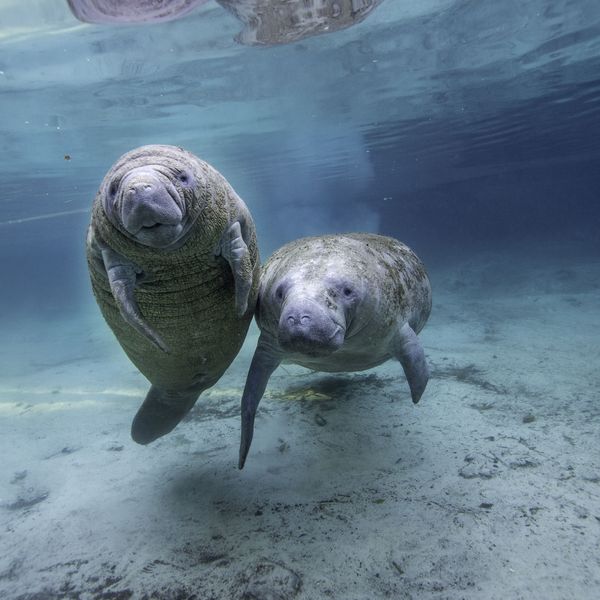"Extinction Crisis": 21,000 of World's Species at Risk of Disappearing
Latest update to Red List of threatened species provides "further evidence of our impact on the world's threatened biodiversity"
An "extinction crisis" is at hand. Roughly 21,000 species, ranging from shrimp to pine trees, are at risk of complete extinction according to an update released Tuesday to an ongoing risk assessment of the world's 1.82 million species.
According to the Red List of Threatened Species, 20,934 of the roughly 70,000 species assessed thus far are threatened with extinction. This year saw an additional 4,807 species to the list.
Calling the news "alarming," Jane Smart, of the International Union for Conservation of Nature (IUCN) which is behind the list, said, "We must use this knowledge to its fullest - making our conservation efforts well targeted and efficient - if we are serious about stopping the extinction crisis that continues to threaten all life on Earth."
This update "is further evidence of our impact on the world's threatened biodiversity, further evidence that extinction is real, and that we must all act, and act now, if we are to prevent this most tragic reality for many more of the world's species," added Richard Edwards, Chief Executive of Wildscreen, a partner of IUCN.
Among this year's addition are the results of the first-ever global assessment of freshwater shrimps--animals vital to freshwater ecosystems--of which 28% are threatened with extinction. According to the list, one such species, the Macrobrachium leptodactylus, was declared extinct after it fell "victim of habitat degradation and urban development."
Tuesday's release also includes the first global reassessment of conifers--the oldest and largest species on the planet--which found that "34% of the world's cedars, cypresses, firs and other cone-bearing plants are now threatened with extinction - an increase by 4% since the last complete assessment in 1998."
"We are sending a warning," IUCN's Red List Manager Craig Hilton-Taylor told AFP, stressing the huge importance of conifers for their role in the sequestering of carbon.
"The more we have deforestation in the northern hemisphere, the greater the impact will be in terms of climate change," he said.
_____________________
An Urgent Message From Our Co-Founder
Dear Common Dreams reader, The U.S. is on a fast track to authoritarianism like nothing I've ever seen. Meanwhile, corporate news outlets are utterly capitulating to Trump, twisting their coverage to avoid drawing his ire while lining up to stuff cash in his pockets. That's why I believe that Common Dreams is doing the best and most consequential reporting that we've ever done. Our small but mighty team is a progressive reporting powerhouse, covering the news every day that the corporate media never will. Our mission has always been simple: To inform. To inspire. And to ignite change for the common good. Now here's the key piece that I want all our readers to understand: None of this would be possible without your financial support. That's not just some fundraising cliche. It's the absolute and literal truth. We don't accept corporate advertising and never will. We don't have a paywall because we don't think people should be blocked from critical news based on their ability to pay. Everything we do is funded by the donations of readers like you. Will you donate now to help power the nonprofit, independent reporting of Common Dreams? Thank you for being a vital member of our community. Together, we can keep independent journalism alive when it’s needed most. - Craig Brown, Co-founder |
An "extinction crisis" is at hand. Roughly 21,000 species, ranging from shrimp to pine trees, are at risk of complete extinction according to an update released Tuesday to an ongoing risk assessment of the world's 1.82 million species.
According to the Red List of Threatened Species, 20,934 of the roughly 70,000 species assessed thus far are threatened with extinction. This year saw an additional 4,807 species to the list.
Calling the news "alarming," Jane Smart, of the International Union for Conservation of Nature (IUCN) which is behind the list, said, "We must use this knowledge to its fullest - making our conservation efforts well targeted and efficient - if we are serious about stopping the extinction crisis that continues to threaten all life on Earth."
This update "is further evidence of our impact on the world's threatened biodiversity, further evidence that extinction is real, and that we must all act, and act now, if we are to prevent this most tragic reality for many more of the world's species," added Richard Edwards, Chief Executive of Wildscreen, a partner of IUCN.
Among this year's addition are the results of the first-ever global assessment of freshwater shrimps--animals vital to freshwater ecosystems--of which 28% are threatened with extinction. According to the list, one such species, the Macrobrachium leptodactylus, was declared extinct after it fell "victim of habitat degradation and urban development."
Tuesday's release also includes the first global reassessment of conifers--the oldest and largest species on the planet--which found that "34% of the world's cedars, cypresses, firs and other cone-bearing plants are now threatened with extinction - an increase by 4% since the last complete assessment in 1998."
"We are sending a warning," IUCN's Red List Manager Craig Hilton-Taylor told AFP, stressing the huge importance of conifers for their role in the sequestering of carbon.
"The more we have deforestation in the northern hemisphere, the greater the impact will be in terms of climate change," he said.
_____________________
An "extinction crisis" is at hand. Roughly 21,000 species, ranging from shrimp to pine trees, are at risk of complete extinction according to an update released Tuesday to an ongoing risk assessment of the world's 1.82 million species.
According to the Red List of Threatened Species, 20,934 of the roughly 70,000 species assessed thus far are threatened with extinction. This year saw an additional 4,807 species to the list.
Calling the news "alarming," Jane Smart, of the International Union for Conservation of Nature (IUCN) which is behind the list, said, "We must use this knowledge to its fullest - making our conservation efforts well targeted and efficient - if we are serious about stopping the extinction crisis that continues to threaten all life on Earth."
This update "is further evidence of our impact on the world's threatened biodiversity, further evidence that extinction is real, and that we must all act, and act now, if we are to prevent this most tragic reality for many more of the world's species," added Richard Edwards, Chief Executive of Wildscreen, a partner of IUCN.
Among this year's addition are the results of the first-ever global assessment of freshwater shrimps--animals vital to freshwater ecosystems--of which 28% are threatened with extinction. According to the list, one such species, the Macrobrachium leptodactylus, was declared extinct after it fell "victim of habitat degradation and urban development."
Tuesday's release also includes the first global reassessment of conifers--the oldest and largest species on the planet--which found that "34% of the world's cedars, cypresses, firs and other cone-bearing plants are now threatened with extinction - an increase by 4% since the last complete assessment in 1998."
"We are sending a warning," IUCN's Red List Manager Craig Hilton-Taylor told AFP, stressing the huge importance of conifers for their role in the sequestering of carbon.
"The more we have deforestation in the northern hemisphere, the greater the impact will be in terms of climate change," he said.
_____________________

